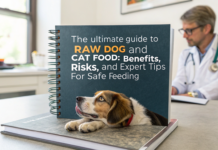Last Updated on March 30, 2024 by Dogs Vets
The Ultimate Guide to Organic Dog Food Brands
In the world of canine nutrition, the shift towards organic food has become more than just a trend—it’s a movement. Pet parents everywhere are on a quest to provide their furry companions with the healthiest, most nutritious diet possible.
This guide delves deep into the world of organic dog food brands, offering insights, recommendations, and everything you need to know to make an informed decision for your four-legged family member.
Why Organic Matters
The term “organic” refers to the way agricultural products are grown and processed.
For dog food to be certified organic, it must meet strict guidelines set by the USDA, including no use of synthetic fertilizers, pesticides, or GMOs.
This natural approach ensures that your dog is not exposed to harmful chemicals, leading to a healthier lifestyle and potentially longer lifespan.
The Benefits of Organic Dog Food Brands
When it comes to feeding our furry friends, we want to make sure they’re getting the best nutrition possible. That’s why many pet owners are turning to organic dog food brands.
These brands prioritize using natural, high-quality ingredients that are free from artificial additives and pesticides. But what exactly are the benefits of feeding your dog organic food?
1. Healthier Ingredients
Organic dog food brands are committed to using only the highest quality ingredients. This means that your furry friend will be getting a balanced diet that is free from harmful chemicals and artificial fillers.
By feeding your dog organic food, you can help support their overall health and well-being.
2. Improved Digestion
Many dogs struggle with digestive issues, such as food allergies or sensitivities. Organic dog food brands often use limited ingredient formulas, making it easier for dogs with sensitive stomachs to digest their food. This can lead to fewer digestive issues and a happier, healthier pup.
3. Environmental Sustainability
Choosing organic dog food brands is not only beneficial for your pet, but also for the environment. These brands prioritize sustainable farming practices and avoid the use of harmful pesticides and chemicals.
By supporting organic dog food brands, you’re helping to reduce your pet’s carbon pawprint.
Top Organic Dog Food Brands to Consider
Selecting the right organic dog food brand can be overwhelming, given the plethora of options available.
However, some brands stand out for their commitment to quality, transparency, and nutritional excellence. Brands like Castor & Pollux, Newman’s Own Organics, and The Honest Kitchen are renowned for their high-quality ingredients and comprehensive nutritional profiles.
Understanding Organic Certifications
When navigating the realm of organic dog foods, it’s crucial to understand the significance of organic certifications. The USDA Organic Seal is the gold standard, indicating that the food contains at least 95% organic ingredients.
Other certifications, such as Non-GMO Project Verified, add an extra layer of trust and quality assurance.
Benefits of Feeding Your Dog Organic Food
Feeding your dog organic food comes with a myriad of benefits, including improved digestion, higher energy levels, and a healthier coat.
Moreover, organic foods are often made with higher-quality protein sources, which are essential for your dog’s overall health and well-being.
Ingredients to Look for in Organic Dog Food
Quality organic dog food should contain a balance of proteins, fats, carbohydrates, vitamins, and minerals.
Look for foods that list real meat, vegetables, and whole grains as their primary ingredients. Avoid products with artificial additives, preservatives, or fillers.
Customizing Your Dog’s Organic Diet
Every dog is unique, and their dietary needs can vary greatly. Consider factors such as age, breed, activity level, and any health issues when selecting an organic dog food.
Consulting with a veterinarian can also provide personalized advice tailored to your dog’s specific needs.
The Cost of Organic Dog Food: Is It Worth It?
While organic dog food can be more expensive than conventional options, many pet parents find the health benefits and peace of mind to be worth the extra cost.
Investing in quality food can also lead to lower veterinary bills over time, as a healthy diet contributes to overall wellness.
Transitioning to Organic Dog Food
Switching your dog to an organic diet should be done gradually to avoid digestive upset.
Start by mixing a small amount of organic food with their current diet, slowly increasing the proportion over several days until the transition is complete.
Sustainability and Ethical Considerations
Choosing organic dog food not only benefits your pet’s health but also supports sustainable farming practices and animal welfare. Many organic brands are committed to ethical sourcing and production, contributing to a healthier planet.
Conclusion
Embracing organic dog food is a step towards ensuring your furry friend enjoys a nutritious, balanced diet free from harmful chemicals and additives.
With the information provided in this guide, you’re well-equipped to make an informed choice that supports your dog’s health and happiness.
FAQs
- What makes dog food organic?
- Organic dog food must comply with strict USDA guidelines, including being free from synthetic pesticides, fertilizers, antibiotics, hormones, and GMOs.
- Can organic dog food improve my dog’s health?
- Yes, organic dog food can lead to better health outcomes for your dog, including improved digestion, more energy, and a healthier coat.
- Is organic dog food more expensive than regular dog food?
- Generally, organic dog food is more expensive due to the higher quality and cost of organic ingredients. However, the investment can pay off in terms of your dog’s health and well-being.
- How do I switch my dog to an organic diet?
- Transition your dog gradually by mixing organic food with their current diet, slowly increasing the organic portion over several days.
- Are there organic dog foods for specific health needs?
- Yes, many organic dog food brands offer formulations tailored to specific health issues, such as allergies, joint health, or weight management.
- How can I be sure a dog food is truly organic?
- Look for the USDA Organic Seal on the packaging, which indicates the product meets strict organic standards.
- Can all dogs eat organic food?
- Yes, organic food is suitable for dogs of all ages and breeds. However, consult with your veterinarian to ensure it meets your dog’s specific dietary needs.
This guide aims to empower you with knowledge and insights into the benefits and considerations of choosing organic dog food, ensuring your beloved pet enjoys a healthy, happy life.
So, if you’re looking to give your furry friend the best nutrition possible, consider switching to an organic dog food brand. Your dog will thank you for it!
References:
- fficial Certifications and Standards
- USDA National Organic Program: Visit the official USDA website to find detailed information about organic standards and certification processes. (https://www.usda.gov/topics/organic)
- Veterinary and Animal Nutrition Experts
- Articles, studies, or blog posts written by veterinarians or animal nutritionists on the benefits of organic dog food. Look for authors with credentials (DVM, PhD) from institutions like the American College of Veterinary Nutrition (https://acvn.org).
Fact Check
We strive to provide the latest valuable information for pet lovers with accuracy and fairness. If you would like to add to this post or advertise with us, don’t hesitate to reach us. If you see something that doesn’t look right, contact us!























